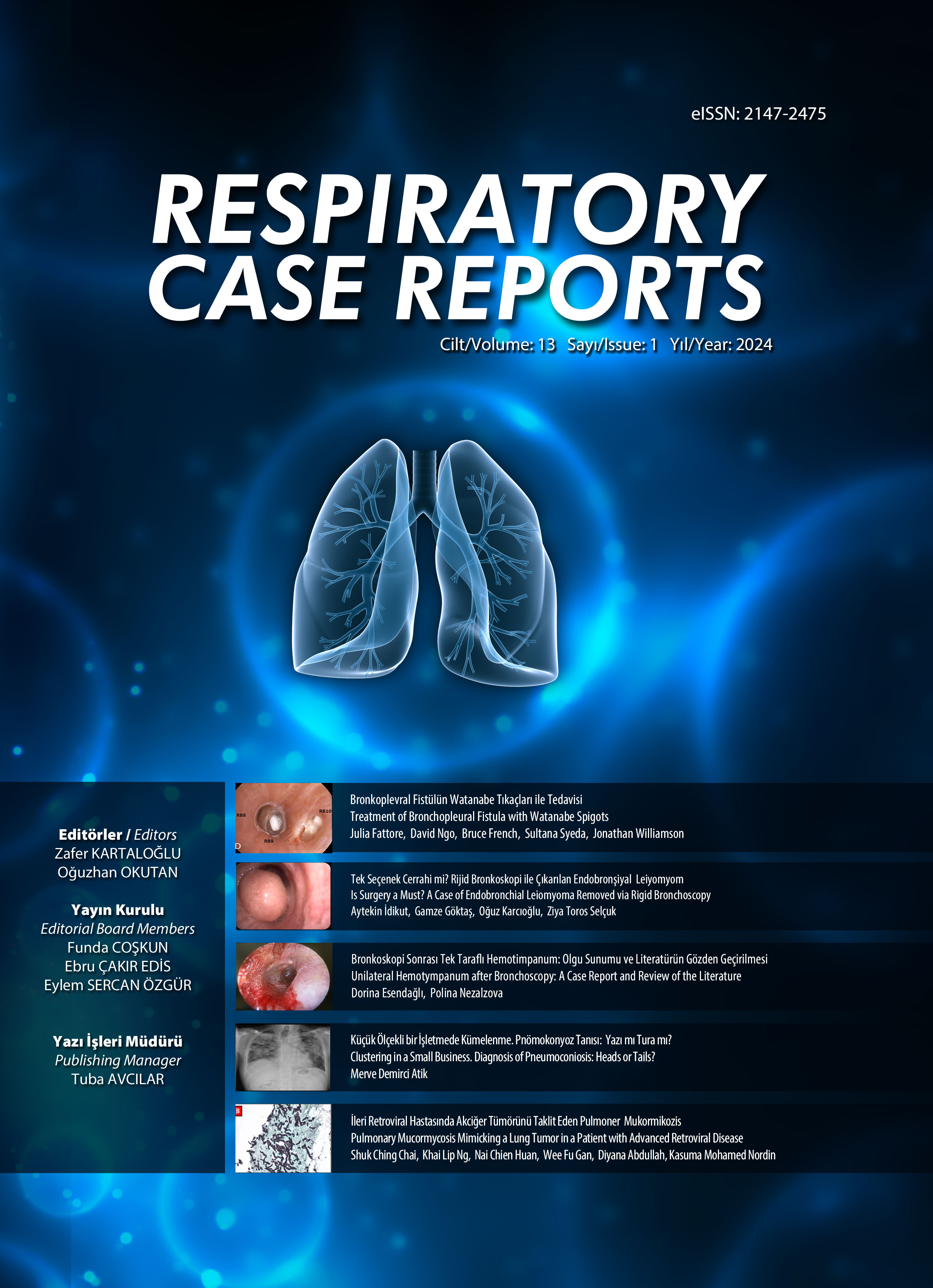
A Case of Ectopic Cushing Syndrome Caused by ACTH-Releasing Bronchial Carcinoid
Burçin Çelik1, Uğur Avcı2, Ayşegül Atmaca21Ondokuz Mayis University Medical School, Department Of Thoracic Surgery, Samsun, Turkey2Ondokuz Mayis University Medical School, Department Of Endocronology, Samsun, Turkey
Small cell lung cancer and bronchopulmonary carcinoid tumors are the most common causes of an ectopic release of adrenocorticotropic hormone (ACTH) release. In this article, a patient with Cushing syndrome caused by an ACTH-releasing bronchial carcinoid tumor is presented. A 65-year-old female patient was admitted to the emergency service with the complaints of blurred consciousness and loss of speech, and was diagnosed with hypoglycemia, hypopotassemia, hypercortisolemia, and a high ACTH level. Magnetic resonance images (MRI) of the pituitary gland and the abdomen revealed no pathology. Since the pituitary MRI was normal, and her central/peripheral ACTH gradient was less than 2 in bilateral inferior petrosal sinus sampling, it was considered to be a case of ectopic ACTH release. A thorax computed tomography (CT) revealed a 12x10 mm subpleural nodule at the right upper lobe apical segment. Pathological fludeoxyglucose involvement was not observed in PETCT imaging. The patient underwent video-assisted thoracoscopic surgery wedge resection under general anesthesia and was diagnosed with typical bronchial carcinoid based on a histological study. She was discharged (in that condition) on the fifth postoperative day. Although the survival rate in patients with ectopic Cushing syndrome caused by carcinoid tumor has been reported to be 70%, the prognosis in patients over 60 is worse. The surgical elimination of the source is the most significant step in treatment.
Keywords: lung, Cushing syndrome, carcinoid tumor, ectopicACTH Salgılayan Bronşiyal Karsinoidin Neden Olduğu Ektopik Cushing Sendromu Olgusu
Burçin Çelik1, Uğur Avcı2, Ayşegül Atmaca21Ondokuz Mayıs Üniversitesi Tıp Fakültesi, Göğüs Cerrahisi Ad, Samsun2Ondokuz Mayıs Üniversitesi Tıp Fakültesi, Endokrinoloji Ad, Samsun
Küçük hücreli akciğer kanseri ve bronkopulmoner karsinoid tümörler ektopik ACTH salınımının en sık nedenidir ve oldukça nadir bir durumdur. Bu makalede ACTH salgılayan bronşiyal karsinoid tümörünün neden olduğu ektopik Cushing sendromlu olguyu sunduk. Bilinç bulanıklığı ve konuşamama şikayetleri acil servise başvuran 65 yaşında kadın hastada hipoglisemi, hipopotasemi, hiperkortizolemi ve ACTH yüksekliği saptandı. Hastanın hipofiz ve batın MR'da patoloji saptanmadı. Hastada hipofizer MR'ın normal olması ve bilateral inferior petrozal sinüs örneklemesinde santral/periferik ACTH gradientinin 2'nin altında olması ektopik ACTH salınımını düşündürdü. Toraks BT'de sağ üst lob apikal segmentte 12x10 mm subplevral nodül izlendi, PET-BT görüntülemede patolojik FDG tutulumu izlenmedi. Hastaya genel anestezi altında VATS wedge rezeksiyon uygulandı ve histolojik incelemede tipik bronşial karsinoid tanısı kondu. Hasta postoperatif 5. gününde haliyle ile taburcu edildi. Karsinoid tümöre bağlı ektopik Cushing sendromlu olgularda 5 yıllık sağkalım %70 olarak bildirilmekle birlikte 60 yaş üstü hastalarda prognozun daha kötü olduğu rapor edilmektedir. Cerrahi olarak kaynağın ortadan kaldırabilmesi hastanın tedavisindeki en önemli adımdır.
Anahtar Kelimeler: akciğer, Cushing sendromu, ektopik, karsinoid tumorManuscript Language: Turkish











